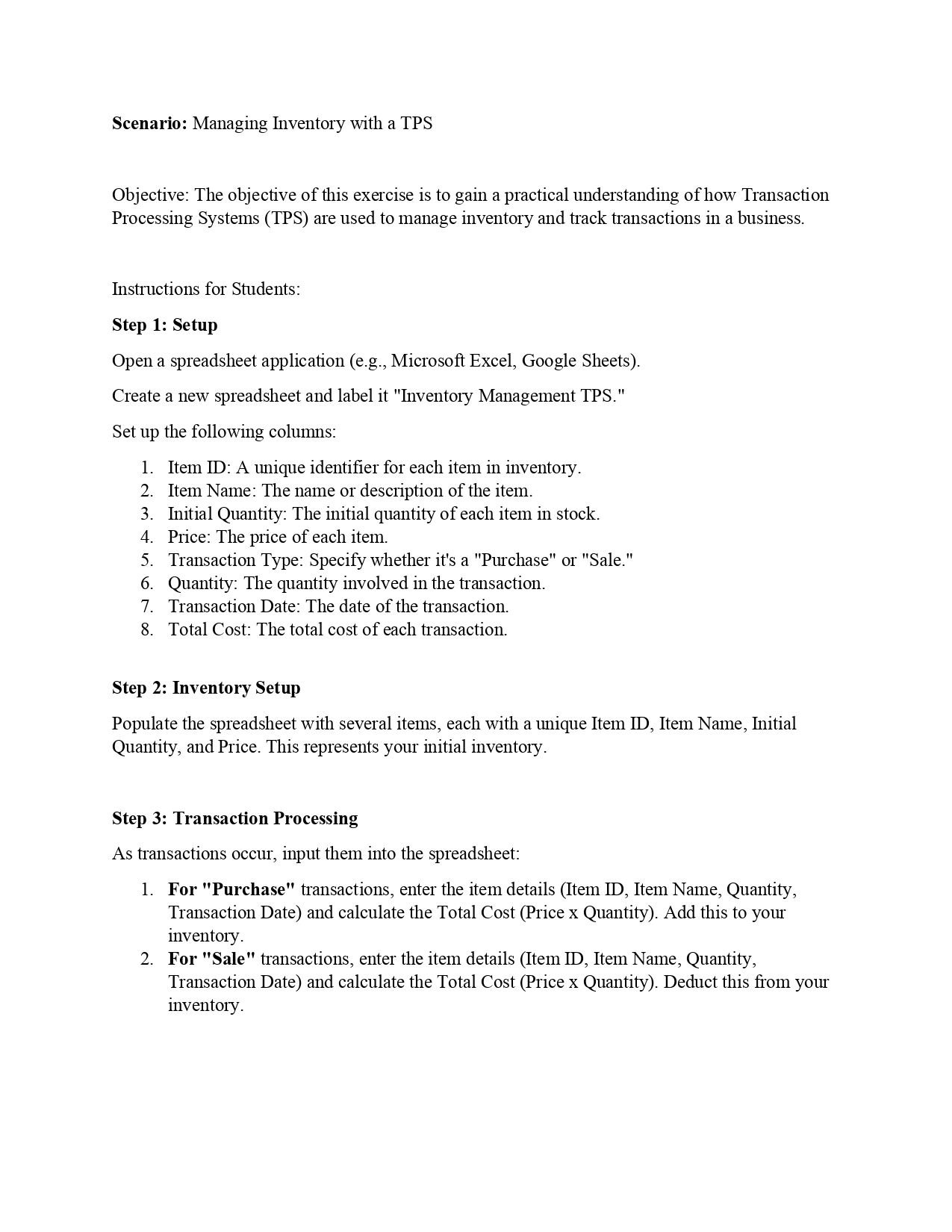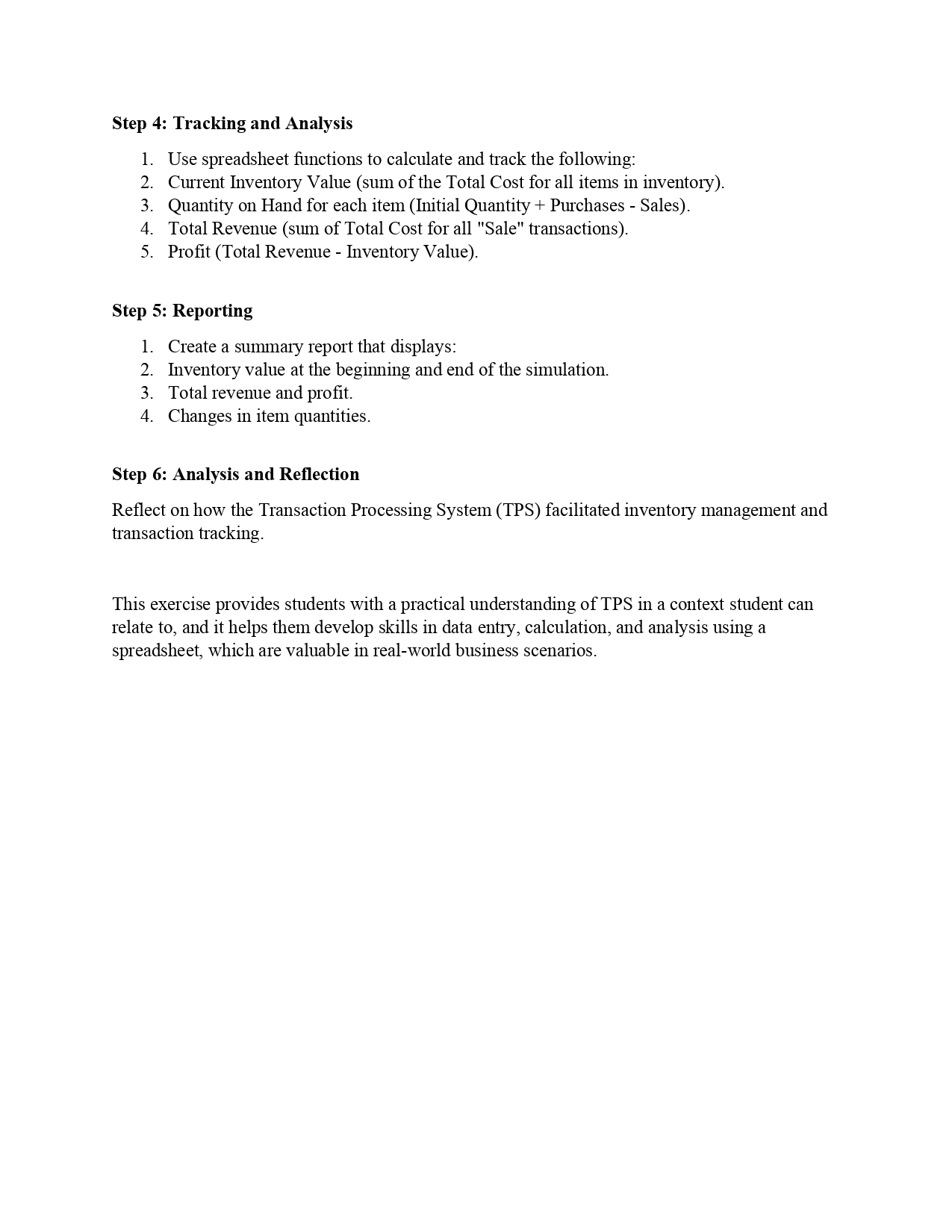Answered step by step
Verified Expert Solution
Question
1 Approved Answer
Instructions for Students: Step 1: Setup Open a spreadsheet application (e.g., Microsoft Excel, Google Sheets). Create a new spreadsheet and label it Inventory Management TPS.

 Instructions for Students: Step 1: Setup Open a spreadsheet application (e.g., Microsoft Excel, Google Sheets). Create a new spreadsheet and label it "Inventory Management TPS." Set up the following columns: 1. Item ID: A unique identifier for each item in inventory. 2. Item Name: The name or description of the item. 3. Initial Quantity: The initial quantity of each item in stock. 4. Price: The price of each item. 5. Transaction Type: Specify whether it's a "Purchase" or "Sale." 6. Quantity: The quantity involved in the transaction. 7. Transaction Date: The date of the transaction. 8. Total Cost: The total cost of each transaction. Step 2: Inventory Setup Populate the spreadsheet with several items, each with a unique Item ID, Item Name, Initial Quantity, and Price. This represents your initial inventory. Step 3: Transaction Processing As transactions occur, input them into the spreadsheet: 1. For "Purchase" transactions, enter the item details (Item ID, Item Name, Quantity, Transaction Date) and calculate the Total Cost (Price x Quantity). Add this to your inventory. 2. For "Sale" transactions, enter the item details (Item ID, Item Name, Quantity, Transaction Date) and calculate the Total Cost (Price x Quantity). Deduct this from your inventory. Step 4: Tracking and Analysis 1. Use spreadsheet functions to calculate and track the following: 2. Current Inventory Value (sum of the Total Cost for all items in inventory). 3. Quantity on Hand for each item (Initial Quantity + Purchases - Sales). 4. Total Revenue (sum of Total Cost for all "Sale" transactions). 5. Profit (Total Revenue - Inventory Value). Step 5: Reporting 1. Create a summary report that displays: 2. Inventory value at the beginning and end of the simulation. 3. Total revenue and profit. 4. Changes in item quantities. Step 6: Analysis and Reflection Reflect on how the Transaction Processing System (TPS) facilitated inventory management and transaction tracking
Instructions for Students: Step 1: Setup Open a spreadsheet application (e.g., Microsoft Excel, Google Sheets). Create a new spreadsheet and label it "Inventory Management TPS." Set up the following columns: 1. Item ID: A unique identifier for each item in inventory. 2. Item Name: The name or description of the item. 3. Initial Quantity: The initial quantity of each item in stock. 4. Price: The price of each item. 5. Transaction Type: Specify whether it's a "Purchase" or "Sale." 6. Quantity: The quantity involved in the transaction. 7. Transaction Date: The date of the transaction. 8. Total Cost: The total cost of each transaction. Step 2: Inventory Setup Populate the spreadsheet with several items, each with a unique Item ID, Item Name, Initial Quantity, and Price. This represents your initial inventory. Step 3: Transaction Processing As transactions occur, input them into the spreadsheet: 1. For "Purchase" transactions, enter the item details (Item ID, Item Name, Quantity, Transaction Date) and calculate the Total Cost (Price x Quantity). Add this to your inventory. 2. For "Sale" transactions, enter the item details (Item ID, Item Name, Quantity, Transaction Date) and calculate the Total Cost (Price x Quantity). Deduct this from your inventory. Step 4: Tracking and Analysis 1. Use spreadsheet functions to calculate and track the following: 2. Current Inventory Value (sum of the Total Cost for all items in inventory). 3. Quantity on Hand for each item (Initial Quantity + Purchases - Sales). 4. Total Revenue (sum of Total Cost for all "Sale" transactions). 5. Profit (Total Revenue - Inventory Value). Step 5: Reporting 1. Create a summary report that displays: 2. Inventory value at the beginning and end of the simulation. 3. Total revenue and profit. 4. Changes in item quantities. Step 6: Analysis and Reflection Reflect on how the Transaction Processing System (TPS) facilitated inventory management and transaction tracking Step by Step Solution
There are 3 Steps involved in it
Step: 1

Get Instant Access to Expert-Tailored Solutions
See step-by-step solutions with expert insights and AI powered tools for academic success
Step: 2

Step: 3

Ace Your Homework with AI
Get the answers you need in no time with our AI-driven, step-by-step assistance
Get Started


